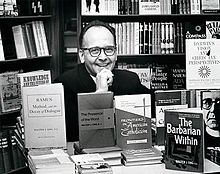User:Sandcastle365/sandbox

Walter Ong[edit]
Walter J. Ong was a scholar with a master's degree in English who was once a student of McLuhan at the Saint Louis University.[2] The contributions of Ong standardized and gave credibility to the field of media ecology as worthy of academic scholarship.[2] Ong explored the changes in human thought and consciousness in the transition from a dominant oral culture to a literate one in his book Orality and Literacy.[3]
Ong's studies have greatly contributed to developing the concept of media ecology. Ong has written over 450 publications, many of which focused on the relation between conscious behavior and the evolution of the media, and he received the Media Ecology Association's Walter Benjamin Award for Outstanding Article for his paper, "Digitization Ancient and Modern: Beginnings of Writing and Today's Computers".[4]
McLuhan's media history[edit]
Marshall McLuhan defined media as anything requiring use of the human body. Under this definition, both computers and clothing can be identified as media. When a media is introduced, it is adapted to human senses so that it becomes an extension of the individual, and its capabilities influence the whole of society, leading to change.[6] McLuhan states that there are three inventions [clarification needed] that transformed the world: the phonetic alphabet, by virtue of its ability to make speech visible, which McLuhan argues gave rise to the discipline of rhetoric in ancient time and to the study of language and poetics, which was also known as grammar. The printing press in the nineteenth century and the telegraph led to both the modern newspaper and also to journalism as an academic pursuit.[7] The introduction of broadcasting in the form of radio, following on the heels of mass circulation newspapers, magazines, as well as the movies, resulted in the study of mass communication.[7] Due to these technologies, the world was taken from one era into the next. In order to understand the effects of symbolic environment, McLuhan splits history into four periods:[8] the Tribal Age, the Literacy Age, the Print Age, and the Electronic Age.
McLuhan states that, in order to study media effectively, one must study not only content but also the whole cultural environment in which media thrives.[9] He argues that using a detached view allows the individual to observe the phenomenon of the whole as it operates within the environment. The effects of media - speech, writing, printing, photograph, radio or television – should be studied within the social and cultural spheres impacted by this technology. McLuhan argues that all media, regardless of content, acts on the senses and reshapes sensory balance, further reshaping the society that created it. This differs from the viewpoints of scholars such as Neil Postman, who argue that society should take a moral view of new media whether good or bad.[10] McLuhan further notes that media introduced in the past brought gradual changes, which allowed people and society some time to adjust.
 | This is a user sandbox of Sandcastle365. You can use it for testing or practicing edits. This is not the sandbox where you should draft your assigned article for a dashboard.wikiedu.org course. To find the right sandbox for your assignment, visit your Dashboard course page and follow the Sandbox Draft link for your assigned article in the My Articles section. |
- ^ "Wikispaces". walter-ong.wikispaces.com. Retrieved 2020-02-17.
- ^ a b Lance, Strate (2006). Echoes and reflections : on media ecology as a field of study. Cresskill, N.J.: Hampton Press. ISBN 9781572737259. OCLC 631683671.
- ^ Ong, Walter J. (2002). Orality and literacy : the technologizing of the word. London: Routledge. ISBN 978-0415281829. OCLC 49874897.
- ^ "About Walter J. Ong, S.J." www.slu.edu. Retrieved 2018-12-03.
- ^ "Google Image Result for https://3.bp.blogspot.com/-IC4z3vHE974/WXhgfnfthjI/AAAAAAAAAEU/4PfHUUR1L9YiskucPa-dRcF883b-hsBOgCLcBGAs/s1600/fsf.png". www.google.com. Retrieved 2020-02-17.
{{cite web}}: External link in|title= - ^ Rogaway, P. (1994). Marshall McLuhan interview from Playboy, 1969. ECS 188: Ethics in the Age of Technology, University of California, Davis
- ^ a b Strate, L. (2008). Media ecology scholars also use broad categories like oral, scribal, print, and electronic cultures. Studying media as media: McLuhan and the media ecology approach.
- ^ McLuhan, M.; Fiore Q.; Agel J. (1967). The Medium is the Massage: An Inventory of Effects. San Francisco: HardWired. ISBN 978-1-888869-02-6.
- ^ Delicata, N. (2008). Marshall McLuhan: Media Ecologist and Educator. Ultimate Reality and Meaning, 31(4), 314-341.
- ^ Postman, N. (2000, June). The humanism of media ecology. In Proceedings of the Media Ecology Association (Vol. 1, No. 1, pp. 10-16)
